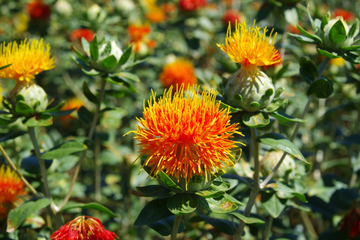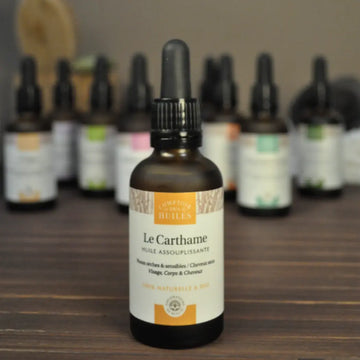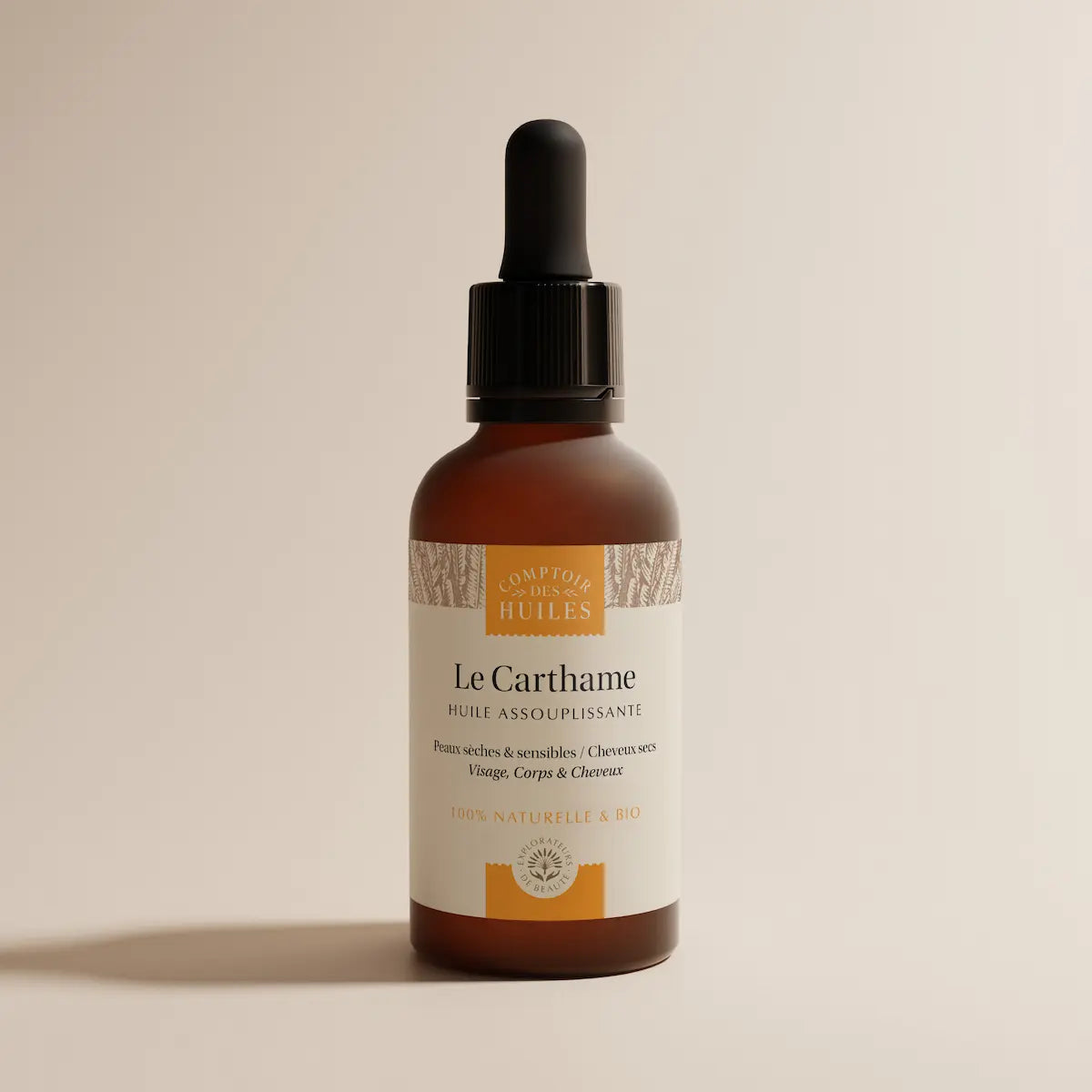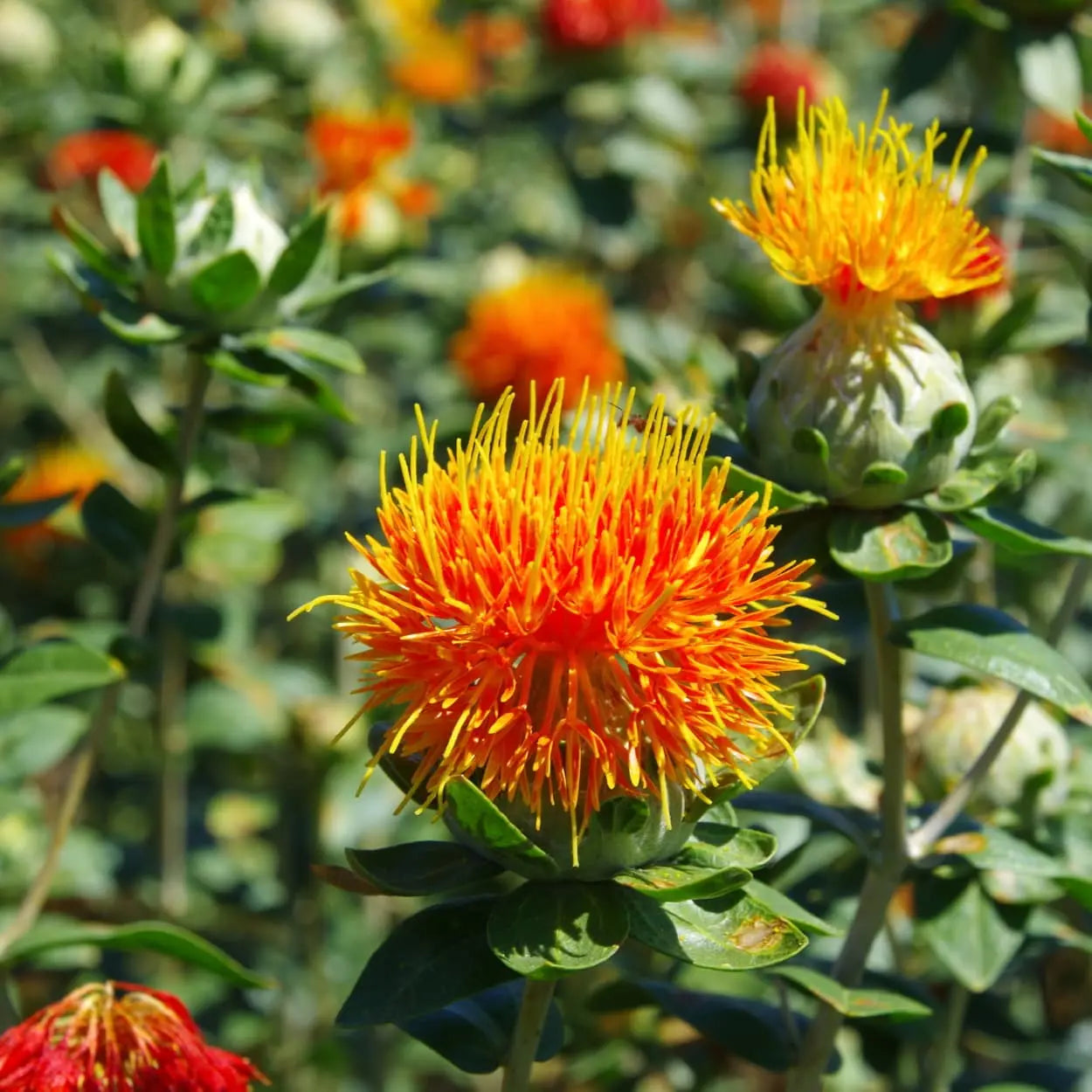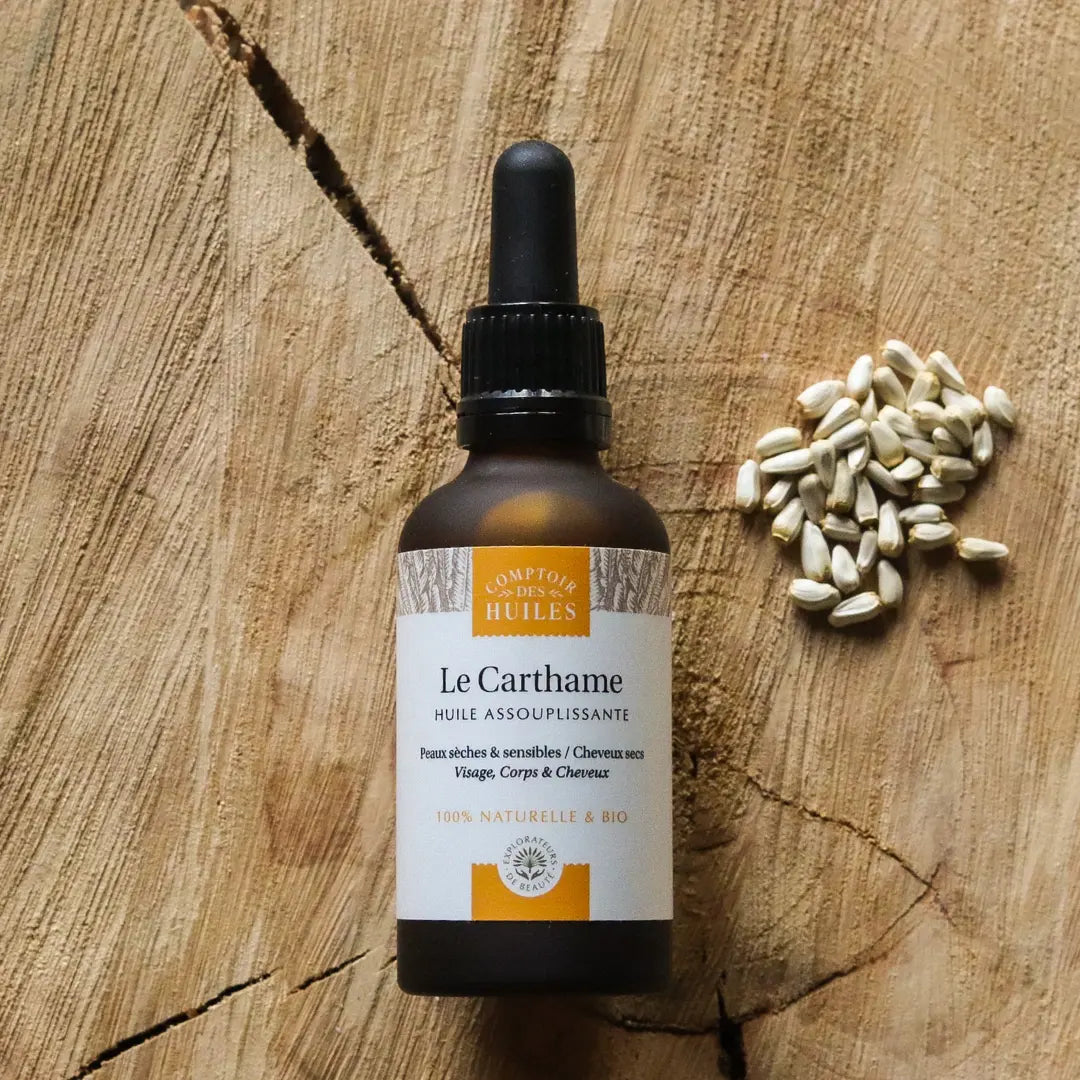The benefits of Safflower vegetable oil
Safflower vegetable oil, extracted from the seeds of Carthamus tinctorius, offers a multitude of benefits for the skin and hair thanks to its composition rich in essential fatty acids, vitamins E and K, which make it a vegetable oil versatile. This vegetable oil is yellowish in color, due to the color of its pistils having a color similar to saffron. Discover the fascinating origins of safflower oil, its beauty benefits, and simple tips for learning how to enjoy all its benefits.
What is the origin of Safflower oil?
Safflower oil is extracted from the seeds of the Carthamus tinctorius plant, commonly known as safflower or dyer's saffron. Safflower is a thorny annual plant native to arid regions of the Middle East and the Mediterranean basin. Traces of its cultivation date back more than 4,000 years, making it one of the oldest domesticated plants.
Safflower was cultivated by the Egyptians, Greeks and Romans for various applications. In ancient Egypt, safflower was mainly used to dye fabrics yellow and red thanks to its natural pigments. Mummies have been discovered with strips of linen dyed with safflower, testifying to its use in funerary rituals.
In addition to its applications in dyeing, the ancient Egyptians and other Mediterranean civilizations also used safflower for medicinal and culinary purposes. It was only later that safflower oil was recognized for its culinary and cosmetic properties, particularly for its benefits on the skin and hair.
What are the benefits of Safflower oil for the skin?
Safflower oil is a great ally for mature, irritated skin prone to redness. Its moisturizing, nourishing and soothing properties make it an effective treatment for rosacea and signs of skin aging. Additionally, its ability to quickly penetrate the skin makes it an ideal option for deep hydration.
Safflower oil is rich in fatty acids and vitamins:
- Omega-6, particularly linoleic acid, is known for its anti-inflammatory and hydrating properties. They help maintain the skin's lipid barrier, preventing moisture loss and protecting against irritation and inflammation.
- Omega-9, for their part, strengthens the barrier function of the skin and helps improve its elasticity and suppleness. Together, these essential fatty acids promote smoother, more hydrated skin that is less prone to irritation and redness.
- Vitamin E present in safflower oil acts as a powerful antioxidant. Antioxidants are essential to protect the skin against damage caused by free radicals, which are unstable molecules responsible for premature aging of the skin. By neutralizing these free radicals, vitamin E helps prevent signs of skin aging, such as fine lines, wrinkles and loss of elasticity.
- Safflower oil is also rich in vitamin K, which has decongestant properties. Vitamin K is particularly effective in reducing skin redness and promoting vasoconstriction of blood vessels. This makes it an ideal ingredient for treating skin conditions such as rosacea and rosacea, where reducing the appearance of dilated blood vessels can significantly improve the appearance of the skin.
How to use Safflower oil to treat redness?
Redness of the skin, such as that caused by rosacea or rosacea, can be particularly bothersome and difficult to treat. Rosacea is often considered a mild form of rosacea. It mainly manifests itself by the presence of small, dilated and visible blood vessels (telangiectasias) on the skin of the face, creating areas of diffuse redness. For effective treatment, safflower oil can be combined with other oils with complementary properties. Italian Helicrysum essential oil is renowned for its anti-inflammatory and healing properties, while Calophyll vegetable oil is recognized for its circulatory and regenerating effects.
A few drops of this synergy can be applied locally morning and evening for optimal results. This combination helps soothe redness, reduce inflammation, and improve the overall appearance of the skin.
What are the benefits of Safflower oil for hair?
In addition to its benefits for the skin, safflower oil is also beneficial for hair, especially those that are dry and damaged. Safflower oil is a natural and effective solution to nourish, moisturize and protect hair. Whether you are looking to improve the health of your hair, stimulate hair growth, or repair damaged hair, safflower oil offers numerous benefits thanks to its rich composition of essential fatty acids, vitamin E, and antioxidants. Incorporating this oil into your hair routine can transform your hair, making it stronger, shinier and healthier. Applying safflower oil to hair will instantly make it shinier and more vibrant.
Used as the main ingredient in a leave-in hair serum, safflower oil deeply nourishes hair, providing shine and suppleness. To maximize its effects, it can be combined with other nourishing and essential oils.
Apply a few drops of this mixture to clean, dry hair. This preparation helps repair dry and damaged hair, prevent split ends, and restore hair to its natural shine and softness.
Safflower oil, with its deep historical roots and its many health and beauty benefits, is a true natural treasure. It offers a multitude of benefits for the skin and hair. Thanks to its composition, it constitutes a valuable addition to any natural care routine. By integrating it into your skincare routines, you can take full advantage of its remarkable properties. Try these different uses of Safflower oil and discover the amazing results it can offer you on a daily basis.
Article written by Sabine Lamusse, our Aromatherapy expert

Sabine introduces herself in a few words:
After obtaining my degree in Psychology at the University of Paris 8, I embarked on a fascinating journey into the world of aromatherapy, where I finally found my calling. Today, as an aromatologist, I guide and advise in the use of essential oils, vegetable oils and hydrosols. My approach integrates scientific rigor while taking into account energetic, emotional and cosmetic dimensions.
I have always been oriented towards others, characterized by great empathy and natural kindness. This is how I was initially led to pursue studies in Psychology.
I made a commitment to share this knowledge so that everyone can benefit from the benefits of aromatherapy in their daily lives, whether in terms of physical, emotional, cosmetic health, and much more.
I have a deep passion for essential oils, and I can't wait to share the wonders they can do every day!


